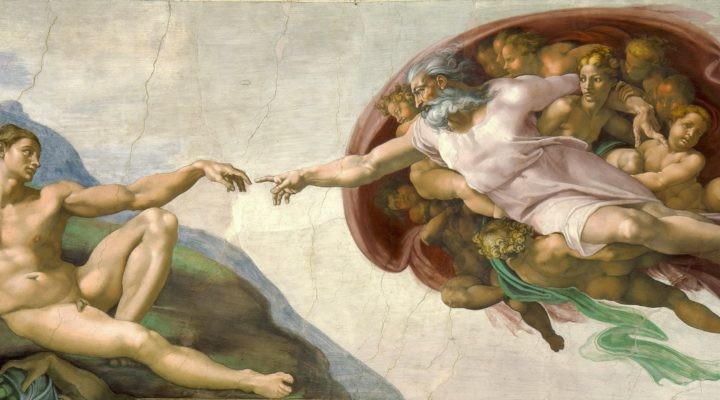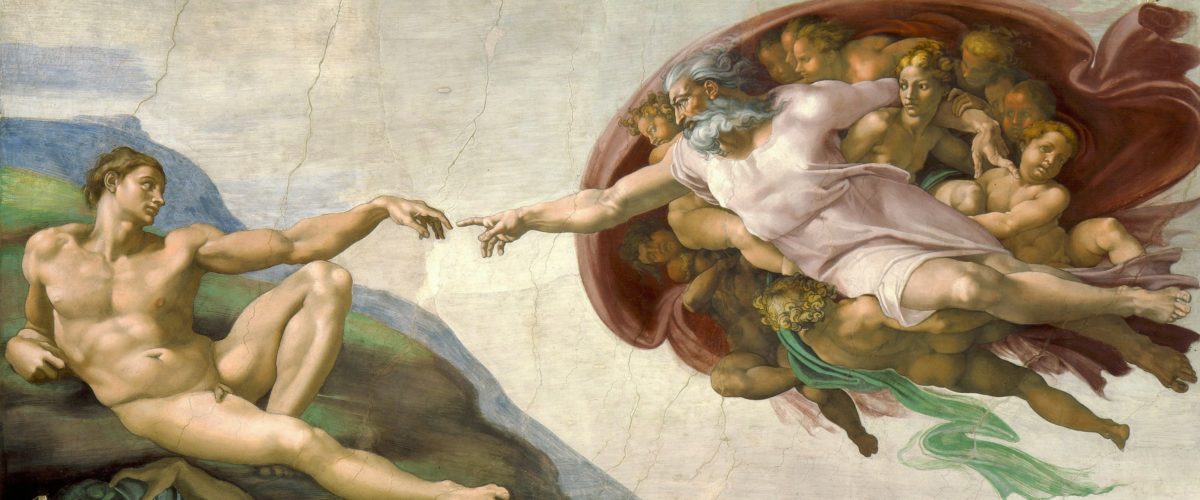My body was tense as I sat in the white-walled classroom of my Baptist high school in Middle Georgia. With the sounds of pretend canons firing at the Civil War reenactment across the street, I listened to my teacher tell us about how President Bill Clinton was preparing to declare himself “President Forever,” and then hand the United States over to the United Nations.
We were a young-earth Creationist, Dispensationalist school that believed Y2K would bring about a seven-year Tribulation during which the United Nations would force everyone either to worship the antichrist or be decapitated. With my salvation always in doubt, I could not be certain that I would be raptured away to heaven with all the Christians beforehand. So having Democrats in charge of the United States meant I was in danger of being decapitated.
“Having Democrats in charge of the United States meant I was in danger of being decapitated.”
So how on earth did I go from being afraid of losing my head to voting for Democrats for the first time just 20 years later?
Descending into fear
With Al Gore receiving the Democratic nomination for president, our fears of Clinton declaring himself “President Forever” began to subside. I went off to pursue a bachelor’s degree in Bible from Bob Jones University — which had just reversed its ban on interracial dating that it had long claimed was based on God’s design to keep the races separate after the Tower of Babel — because it was hurting George W. Bush’s campaign after he spoke there.
When we sat in shock for our chapel service on Sept. 11, 2001, we were told it was over. God was bringing judgment to America. Of course, we had our economic differences from the Democrats. I always figured that trickle-down economics was just common sense, and that if anyone knew the basics of economics they’d see that. But as vehement as we were about tax policy, we didn’t believe tax brackets were ultimately why God was supposedly judging us. We believed God was using the Muslims to judge us because of our toleration of evolutionists, the LGBTQ community and the abortionists.
I started working in the shipping department of a local evangelical music store, where we listened to talk radio and riled each other up about Tom Daschle and the Democrats every afternoon. Until 2017, I was a daily listener of Hugh Hewitt, Mike Gallagher, Rush Limbaugh, Dennis Prager and Sean Hannity. And when I could afford cable television, Fox News would fill my evenings.
I was afraid of Muslims, who I believed were a bunch of terrorists trying to murder us.
I was afraid of evolutionists, who I believed were conspiring together to undermine the inerrant word of God so that Christians would no longer have an objective universal standard of truth.
I was afraid of the LGBTQ community because I interpreted Romans 1:18-28 to mean God had made them gay as a culminating punishment for living a life of unthankfulness and self-centeredness.
I was afraid of pro-choice voters, who I believed were baby killers and would one day force Christians to have abortions like the Communist Chinese government was doing.
“All of that fear fueled a desperate need for the Republicans to win every election.”
All of that fear fueled a desperate need for the Republicans to win every election. Yet the Black community overwhelmingly voted for the Democrats. So I feared them as well, while also being fascinated with the few who didn’t vote Democrat because liking them made me feel like I wasn’t racist or afraid.
Rejoicing in retribution
After my non-Christian grandfather died in 2002, I was so overcome with guilt over not warning him about hell that I became a Calvinist to numb my pain so I wouldn’t feel at fault for his unbelief.
For the next 15 years, I was theologically formed by men like John Piper and John MacArthur in the retributive tradition of Jonathan Edwards and John Calvin. These men used Romans 9 to prove that God predestined people he loved as vessels of mercy prepared for glory and people he hated as vessels of wrath prepared for destruction.
Jonathan Edwards summed this view up when he said, “The saints … are called upon to rejoice … in seeing the love and tenderness of God towards them, manifested in his severity towards their enemies. … The just damnation of the wicked will be an occasion of rejoicing to the saints in glory … to rejoice in seeing his love to them in executing justice on his enemies … for the heavenly inhabitants will know that it is not fit that they should love them, because they will know then, that God has no love to them, nor pity for them.”
“I figured I should rejoice when Democrats met their eternal fate. All these law breakers deserved what they were getting.”
If God’s desire was to enact harsh judgment in retribution against those who stood in the way of the saints, and if our desires should align with God’s, then I figured I should rejoice when Democrats met their eternal fate. All these law breakers deserved what they were getting. And that just retribution included not only eternal conscious torment, but prison sentences and torture on the battlefield.
During the 2016 election, we had a Bernie Sanders supporter living with us. After watching The Big Short together one night, we got into a huge argument. As the conversation escalated, I eventually exploded, saying, “Bernie Sanders is going to burn in hell for his beliefs!”
Ultimately, a few of us had the hope of the cross. On the cross, we believed the Father retributively beat and crushed Jesus in our place. And so every Sunday morning was filled with rejoicing over the Father’s violent wrath by proclaiming, “You the perfect Holy One crushed Your Son … . Your justice has been met. And holy wrath is satisfied … . And now I’m loved forevermore because of what you’ve done!”
Healing through self-awareness
In 2015, I began a year-long journey with a worship school. On the first night, they told us we needed to have God-awareness and self-awareness. And while I was totally certain in my God-awareness, I had never even considered the concept of self-awareness.
“I had no idea how much pain I had been suppressing or how my theology had been numbing my pain rather than helping me grieve toward healing.”
As I came face to face with my wounds, I wept. I had no idea how much pain I had been suppressing or how my theology had been numbing my pain rather than helping me grieve toward healing. Over the next year, I was required to read authors who I believed were liberal heretics. Yet in my walk through their books and group sessions with the worship school, I was experiencing a depth of self-awareness and healing I had never tasted before.
I began to meet the child within me, to listen to his questions and fears, wonders and wounds. I grieved with him until our hearts were one presence of holy, childlike solitude.
While the theology of retribution remained as formulas in my head, it was beginning to crumble like dry sand at the questions that came from my experience of restorative love.
Eventually, my God-awareness was revealed to be the shifting sands of never-ending retribution that never allowed me to see and love myself, my neighbor or God. And after my theological castle had crumbled, I sat alone in the rubble with my inner child in a posture of compassion and love.
Seeing my neighbor
Learning to see and love yourself well will lead to seeing and loving your neighbor well. With my retributive theology, I could easily dismiss the image of God in my neighbors with more pressing concepts as their total depravity, righteousness being filthy rags, and being worthy of nothing less than eternal conscious torment. But when retributive violence faded from my view of myself, it also faded from my view of my neighbors.
I slowly began to listen to the wounds of Muslims, who had been oppressed by Western Christian colonizers, without having to dismiss their cries out of allegiance to my country or my religion.
I moved into my questions about science and the Bible to discover the undeniable reality of evolution and how climate change is affecting the poor and destroying our planet.
“My LGBTQ customers were by far the most loving, caring, self-giving customers I had.”
Having owned my cleaning business for many years, I worked in retail stores for LGBTQ customers virtually every day. You can tell a lot about people by how they treat the janitor. And my LGBTQ customers were by far the most loving, caring, self-giving customers I had. Their love for me totally dismantled my assumptions about them based on my interpretation of Romans 1. And when I shared that with one of them one evening, he broke down crying.
I could no longer simply categorize women who had abortions as murderers worthy of prison. Instead, I could finally see the unspeakably deep wounds and systemic injustices that led many of them there.
I began seeing how Christians have used a retributive theology of the atonement, penal substitution, God’s wrath, and justice to create systems in America that have fueled the neo-slavery of mass incarceration and violence against our Black neighbors. My gut reaction to violence against my Black neighbors was no longer to listen to talk radio to find out why Limbaugh and Hannity thought they probably deserved it, but now was to grieve and be angry with them.
Through seeing and being present with their wounds, I could begin to get a taste of their wonders and the beauty of who they are.
Loving through liberation
Liberation theologian Mary Potter Engle says there is an “interlocking chain of oppression” that is “the confluence of personal sin and collective evil.” As I have shared from my story, I believe this interlocking chain of oppression has bound a wide variety of marginalized people groups through the links of evangelical retributive theology. Yet, the evangelical culture that brought us Trump overwhelmingly refuses to recognize systemic injustice.
In Lift Every Voice, Engle says, “Liberation theologies stress the obligation of the Christian community and Christian theology to reflect and act upon their responsibilities in history.”
In 2016, while I privately hoped Trump would win, I was healing enough to know I couldn’t vote for him. So I voted third party for the first time in my life. This is where many of my friends find themselves again in 2020.
As I began seeing and loving my neighbor as myself, I began to realize we are all consciousness evolving toward the liberation of greater wholeness. And the more I grieved with my oppressed neighbors, the more I longed to take whatever steps forward I could to assist them in their liberation toward greater wholeness.
“You can’t deny systemic oppression and claim to be loving your marginalized neighbors.”
Based on the evangelical theology of retribution that built and is fueling systemic oppression, I simply cannot in good conscience vote for the Republicans anymore. And while the Democratic Party is nowhere close to a dream solution, they at least recognize that systemic injustice exists and take practical steps toward liberation.
Under Democratic leadership, Muslims will not be talked about with derogatory, fear-fueling language.
Under Democratic leadership, scientific consensus is taken seriously and its recommendations pursued.
Under Democratic leadership, the LGBTQ community is treated with the dignity that being human deserves, rather than as a threat.
Under Democratic leadership, abortions actually go down. So if your vote makes you responsible for abortions, then voting Republican makes you responsible for more abortions, despite your fantasies of eliminating them.
And under Democratic leadership, Black lives actually matter because they are grieved rather than dismissed or explained away.
I realize conservatives will deny that they aren’t loving their neighbor and will propose that capitalism is the best way to love their neighbor. But you can’t deny systemic oppression and claim to be loving your marginalized neighbors.
Joe Biden does not deserve my vote. But in 2020, he will receive it because I believe I have a Christian responsibility to meet the oppressed where they are and serve them with my vote toward their liberation.
 Rick Pidcock is a stay-at-home father of five kids. He and his wife, Ruth Ellen, have started Provoke Wonder, a collaboration of artists that exists to foster child-like worship through story and song. Provoke Wonder’s first album, Consider the Stars, was released in March 2020. Their first children’s book, What If, will be released in 2020. Rick is pursuing a master of arts degree in worship from Northern Seminary.
Rick Pidcock is a stay-at-home father of five kids. He and his wife, Ruth Ellen, have started Provoke Wonder, a collaboration of artists that exists to foster child-like worship through story and song. Provoke Wonder’s first album, Consider the Stars, was released in March 2020. Their first children’s book, What If, will be released in 2020. Rick is pursuing a master of arts degree in worship from Northern Seminary.


